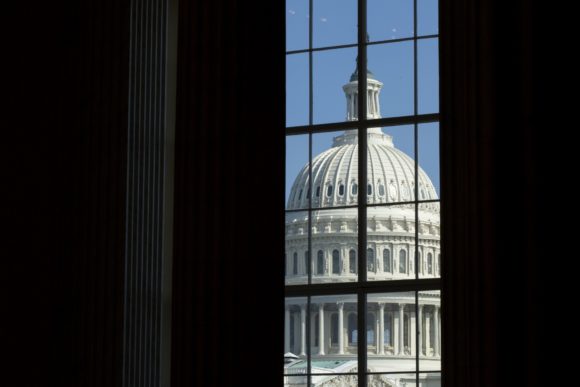Stablecoin legislation overcame a procedural blockade in the US Senate, marking a major victory for the crypto industry after a group of Democrats dropped their opposition Monday.
The industry-backed regulatory bill is now set for debate on the Senate floor with a bipartisan group hoping to pass it as soon as this week, although senators said a final vote could slip until after the Memorial Day recess.
Democrats had united to filibuster the legislation earlier this month amid a furor over President Donald Trump’s crypto dealings along with other concerns related to the regulation of stablecoins.
But the Senate voted 66-32 on Monday night to end the filibuster.
Crypto-friendly Democrats led by Senators Kirsten Gillibrand of New York and Angela Alsobrooks of Maryland negotiated modifications to the legislation and urged their colleagues to support it even without a ban on Trump profiting from his family’s many crypto ventures while in office.
A stablecoin tied to the Trump family that has jumped to a market value exceeding $2 billion since it was announced in March also has stirred criticism.
But Democratic Senator Mark Warner of Virginia, an influential moderate on the Banking Committee, announced Monday he would support the measure, adding that concerns over the Trump family’s business dealings shouldn’t sideline broader stablecoin legislation.
The legislation is “not perfect but it’s far better than the status quo,” Warner said.
Still, the party’s progressive wing led by Elizabeth Warren, the top-ranking Democrat on the Senate Banking Committee, remained vehemently opposed. During the Tuesday night vote, Warren and Gillibrand engaged in a heated argument on the Senate floor.
Warren released a new staff analysis attacking the bill, including the lack of any prohibitions on Trump and his family profiting off of cryptocurrencies his administration would regulate, as well as loopholes the analysis argues would allow criminals and terrorists to exploit stablecoins for transactions outside the traditional banking system.
“Passing this bill means that we can expect more anonymous buyers, big companies and foreign governments to use the president’s stablecoin as both a shadowy bank account shielded from government oversight and as a way to pay off the president personally,” she said. “For crooks, it’s a two-for-one.”
Warren also has repeatedly warned the bill doesn’t have enough safeguards to prevent stablecoins from endangering the financial system’s stability and that systemic risk could spur demands for taxpayer-funded bailouts if a major stablecoin fails. Unlike traditional bank accounts, stablecoins would not be covered by federal deposit insurance, leaving holders at the mercy of bankruptcy proceedings to try and get their money back if a token fails.
Bankers have also expressed concern about stablecoins siphoning off bank deposits and reducing access to credit, particularly for small businesses and farmers who often rely on the banks for loans. Bankers have lobbied — mostly unsuccessfully so far — to bar commercial firms like big tech companies or retailers from issuing their own tokens.
The bankers have won some key concessions, however, including a bar on stablecoins offering interest to depositors. Coinbase Chief Executive Officer Brian Armstrong has argued against the prohibition, envisioning stablecoin accounts as eventually evolving into replacements for bank accounts. If stablecoins were allowed to offer interest or other bonuses, that could entice more consumers to abandon banks.
At the same time, Stand With Crypto, an advocacy group for the industry, said it would make the measure a “key vote” for its scorecard of where senators stand on crypto. Some Democratic supporters of the crypto industry received $10 million worth of support via assorted PACs and super political action committees, while the industry spent $40 million to help defeat Senate Banking Chair Sherrod Brown and replace him with Republican Bernie Moreno, a blockchain entrepreneur and crypto enthusiast.
Retailers also have lobbied for the bill, hoping to profit from cheaper and faster transactions than traditional payment methods including credit and debit cards. Card swipe fees cost US merchants more than $187 billion last year, according to the Nilson Report trade publication.
The House Financial Services Committee has approved its own stablecoin measure, but it has yet to pass the chamber. Some House Republicans want to merge it with a follow-on bill governing regulation of crypto currencies more broadly. The House and Senate will have to reconcile any differences in legislation before sending a final version to Trump’s desk.
Photo: Photographer: Stefani Reynolds/Bloomberg
Was this article valuable?
Here are more articles you may enjoy.



 Insurify Starts App With ChatGPT to Allow Consumers to Shop for Insurance
Insurify Starts App With ChatGPT to Allow Consumers to Shop for Insurance  Florida Engineers: Winds Under 110 mph Simply Do Not Damage Concrete Tiles
Florida Engineers: Winds Under 110 mph Simply Do Not Damage Concrete Tiles  Lemonade Books Q4 Net Loss of $21.7M as Customer Count Grows
Lemonade Books Q4 Net Loss of $21.7M as Customer Count Grows  Former Broker, Co-Defendant Sentenced to 20 Years in Fraudulent ACA Sign-Ups
Former Broker, Co-Defendant Sentenced to 20 Years in Fraudulent ACA Sign-Ups 

